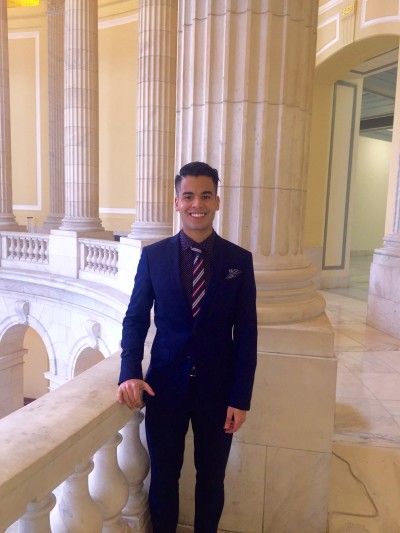Working the Hill: Life as a congressional staff assistant
By Rachel Houston
Rat Race Contributing Writer
(Image above by Martin Falbisoner – CC BY-SA 3.0)

“Good morning, Congressman Beyer’s office,” Pablo Sierra-Carmona said into the phone. As the staff assistant for U.S. Representative Don Beyer (VA-08), it’s a greeting he’s repeated hundreds of times before. But he doesn’t mind.
“Honestly, everything about my job is exciting,” he said. “It’s constantly intriguing. There are lots of things going on and there’s never a dull moment.”
Sierra-Carmona is originally from San Juan, Puerto Rico, but he moved to the U.S. mainland when he was 17 to attend Assumption College in western Massachusetts. It was there that he began to develop an interest in politics. He majored in economics and wrote a political science thesis on Chief Justice John Marshall.
“I was interested in constitutional law, political theory, and the nation’s founding,” Sierra-Carmona said. In college, he worked at the Small Business Service Bureau of Carroll Enterprises in the chairman’s privately-owned United States Presidential Museum. “The chairman did a lot of fundraising and he had many visitors that were prominent elected officials in Massachusetts,” Sierra-Carmona explained. One of Sierra-Carmona’s most memorable experiences was touring Worcester, Massachusetts in November 2014 while election results were being tallied. “I think seeing a lot of people committed and interested in the democratic process inspired me,” he said.
Sierra-Carmona decided to move to Washington and work on Capitol Hill in order to “see it with his own eyes.” In 2015, he began serving as a press intern for the House Judiciary Committee on the Democrat side. “The ranking member is John Conyers,” Sierra-Carmona noted. “He is the dean of the House of Representatives, the longest currently serving member in the House. He’s a civil rights legend.”
After six months as a press intern, Sierra-Carmona was ready to move on. A friend told him about an opening in Rep. Beyer’s office so he submitted an application. After that, he was interviewed by the chief of staff and then Rep. Beyer himself. He began working as a staff assistant in January.
Sierra-Carmona’s pathway to a job on Capitol Hill wasn’t necessarily typical. “A lot of people don’t know that each [congressional] office is its own hiring authority and has its own protocol,” he said. “Some have phone interviews first and then ask for writing samples.”
A staff assistant is the most junior position within a typical congressional office. He or she handles most of the day-to-day interactions with constituents and performs administrative tasks that keep the office running smoothly. The average staff assistant salary is around $30,000.
Though Sierra-Carmona has been working as a staff assistant for only about four months now, he said learning the ropes hasn’t been too difficult. “My office is great about mentorship and helping junior staffers like me,” he said. “Senior staff are open to questions.” A typical congressional office includes two junior staffers (a staff assistant and a legislative correspondent) and five senior staffers (a chief of staff, legislative director, two legislative assistants, and a press secretary).
In addition to the staffers working in Washington, each member of Congress has at least one district office. Rep. Beyer employs five aides in his district office in Alexandria. “The issues I communicate with the district office about vary depending on the calls we receive from constituents,” said Sierra-Carmona. “We usually connect constituents to the district office with issues that affect constituents directly, such as housing, passports, social security, Medicare, immigration, etc.”
Sierra-Carmona’s work hours vary depending on whether Congress is “in session” (meaning members are in Washington) or “in recess” (meaning members are working in their home districts). Usually, he goes into the office at 9 a.m. and stays until around 6 p.m. if evening votes are scheduled. Since votes can be called at any time, Sierra-Carmona helps keep track of them for Rep. Beyer, who is often in meetings with constituents or other members. During recess, Sierra-Carmona said he spends more time reaching out to constituents and making phone calls.
Some of those phone calls concern tour requests. One of Sierra-Carmona’s primary duties is arranging tours for constituents who want to visit Washington. Through a form on Rep. Beyer’s website, constituents may request reservations for tours of the U.S. Capitol Building, White House, Library of Congress, and the Bureau of Engraving and Printing. In one month, Rep. Beyer receives about five hundred tour requests for at least one of those buildings.
Constituents may ask for a staff-led tour of the Capitol, but Sierra-Carmona directs most constituents to the Capitol Visitor’s Center because the docents have master’s degrees and more experience leading tours. Each month Sierra-Carmona receives around 130 requests for Capitol tours.
White House tours can be the trickiest to arrange. “Not only do they receive thousands of requests,” explained Sierra-Carmona, “but they also do background security checks on every visitor whose tour request is approved. It’s a long process. We tell constituents to request tours at least two or three months in advance and four to six months in advance during peak season.” The entire process is complicated, but Sierra-Carmona says some of his favorite moments in his job come when he gets to inform constituents that their White House tour has been approved.
Although Sierra-Carmona was himself an intern less than a year ago, he is now in charge of hiring, training, and supervising his office’s interns. “Right now, some potential interns have submitted applications and I’m reviewing them. Then, I reach out to potential candidates for interviews.” Currently, Sierra-Carmona oversees four college student interns.
Sierra-Carmona also receives requests from constituents for flags that have been flown over the Capitol building. These requests are submitted through the office’s website. Sierra-Carmona then purchases the correct material (cotton or nylon) and size (anywhere from 3 by 5 to 8 by 12 feet) of flag and delivers it to the Architect of the Capitol office. “The flag office then assigns a certificate to the flag which declares that this flag was flown for such and such a person,” Sierra-Carmona explained. “It includes the date it was flown, too.” Constituents commonly request flags for veterans and in memory of milestones like birthdays or other important achievements. “It’s really under the discretion of the constituent who wants to honor someone.” Sierra-Carmona processes approximately fifteen flag requests per month.
Sierra-Carmona said his duties on a particular day can vary, but one of his main responsibilities is making sure the office functions efficiently. His administrative tasks include things like making sure the phones are answered, the printers are working, the business cards are ordered, office supplies are stocked, and the newspapers are handed out each morning— most offices receive The Hill, Politico, The Wall Street Journal, The New York Times, and The Washington Post plus newspapers from their own districts. “I have to make sure things run smoothly, that the office is neat and welcoming. We get a lot of visitors because our district is so close.”
Sorting incoming mail is another way Sierra-Carmona helps the office run efficiently. “It gets delivered three to four times a day and I have to process it,” said Sierra-Carmona. “If it’s an invitation, it goes to the scheduler. If it’s a letter about an issue, I give it to the staffer on that issue. If it’s a note from another member, I forward it to the congressman.” Each day, the congressman and his aides might receive around twenty physical letters. They receive between six and eight thousand e-mails each month.
Many constituents contact the Washington office with questions about decisions the congressman has made on certain issues. “We receive a lot of informative phone calls,” Sierra-Carmona said. “It’s something I value.” He writes down all constituent viewpoints and forwards the message to the appropriate legislative staffer, who then connects with the congressman. Every constituent receives a call, letter, or e-mail response. During a day when Congress is in session, Sierra-Carmona answers about fifty phone calls.
Through these interactions, Sierra-Carmona said he’s learned an important lesson: constituents have a lot of power. “Congressman Beyer takes seriously what his constituents are telling him. Members of Congress know that they are here to serve the people they’re representing. They know they need to help them.” Sierra-Carmona says seeing this relationship has given him more faith in the government process. “It’s made me more patriotic,” he said.
Simply living and working in Washington has moved Sierra-Carmona. “It’s contagious seeing the excitement of tourists. Even people from other countries take pictures outside of the Capitol and are very excited to be there. It’s a phenomenal city.”
One might expect that working for a busy, powerful congressman could be stressful, but Sierra-Carmona could not sing his boss’s praises loudly enough: “Rep. Beyer has this ability to make anyone, especially his constituents, feel like they are his top priority. He is so devoted to making sure they’re happy. He does his best to help them. It’s inspiring. He’s a true politician and statesman. He genuinely wants to serve the people. He’s such a positive and strong presence. He’s brilliant.”
Sierra-Carmona’s exuberance about his job isn’t disguised, either: “There’s so much fun stuff to do that your time flies by. It’s awesome. You feel productive, like you’re contributing to a higher purpose. I’m living my dream.”
The staff assistant position can be a great springboard to other influential positions in Washington. Many staff assistants are promoted to legislative correspondent and then senior congressional staff positions like legislative assistant, scheduler, or press secretary. In addition, Washington think tanks and lobbyists are more likely to hire someone who understands how a congressional office functions.
Sierra-Carmona is already thinking about his next career step: “I would like to go to law school. Initially, I planned to in 2017, but now I’m thinking in 2018.” He’s in the process of looking for LSAT
classes but says his current position is preparing him well. “The Hill is a great place to learn.”
